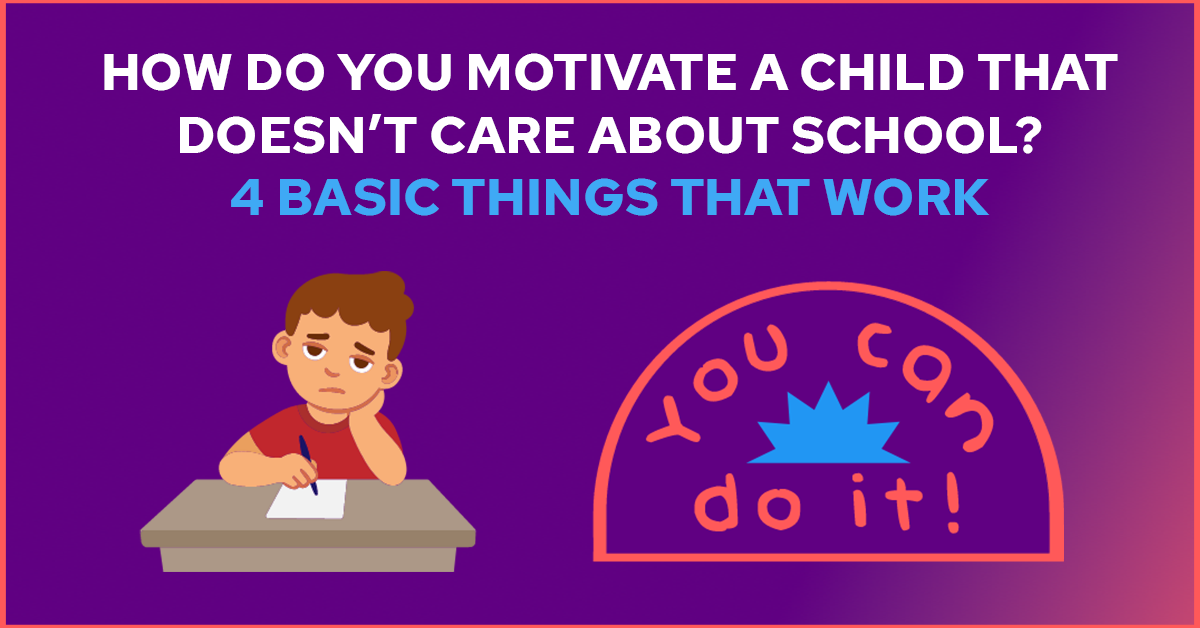4 Ways To Motivate An Unmotivated Child About School

Are you tired of playing the motivation game with your child when it comes to school? You’re not alone. Many parents face this uphill battle, feeling clueless about where to start.
Our blog will guide you through refreshing ways to spark that drive in your kid, turning those dreaded school days into ones they might just look forward to. Ready for a change? Keep reading!
Key Takeaways
- Find out what interests your child and use it to make school exciting. Rewards for doing well can motivate them.
- Talk with your kid about school and listen to their thoughts. This helps find new ways to get them interested in learning.
- Teach your child the value of sticking with tasks, even when tough. Show how patience and hard work pay off over time.
- Setting clear rules and letting kids face natural consequences teaches responsibility. It shows that choices have outcomes.
- Spend quality time together doing fun activities. This builds trust and makes it easier for your child to open up about school struggles.
Understanding the Unmotivated Child

Kids who don’t like school might be saying “no” to it for their own reasons. It’s key to see what lights their fire.
Lack of Motivation as a Form of Resistance

Some children just don’t want to deal with school or homework. They’d rather play video games, hang out, or basically do anything else. This can seem like they simply lack motivation.
But here’s the thing – choosing not to care about school is a choice too. It takes effort to resist and avoid things you don’t want to do.
This act of not caring might look easy, but it’s really their way of saying “no.” They put energy into staying away from tasks like studying and projects. It’s their form of saying “you can’t make me.” This doesn’t mean they’re lazy; it means they’re motivated by something other than what we expect – independence, perhaps? Or maybe it’s a signal that the usual ways schools and parents try to get them interested just aren’t working for them.
The Importance of Identifying What Motivates Your Child

Kids are all different. What gets one child excited to learn might not work for another. That’s why it’s key to figure out what lights a fire in your child. Is it praise, time with friends, or maybe the chance to earn something they really want? Once you know this, you can use it to help them find their drive for schoolwork.
It’s like finding the secret ingredient that makes a meal go from okay to awesome.
Think about rewards and talks about future dreams as tools in your toolbox. These aren’t just nice ideas; they’re powerful ways to get your kid moving in the right direction. Avoiding fights and showing lots of love and support also matter big time.
Picture giving your child a map where X marks the spot of their achievements — but first, you need to understand the treasure they’re after. This understanding is what makes the journey exciting and full of possible wins for them academically!
Strategies for Motivating Your Child

Trying to get your kid excited about school? It’s like trying to make a cat take a bath, right? But don’t worry! We’ve got tricks up our sleeves. First off, it’s all about knowing what makes them tick and using that as fuel.
Think rewards for acing that math test or extra video game time for finishing homework early. And hey, let’s not forget the power of letting them face the music when they slack off – nothing teaches faster than natural consequences, folks!
Encouraging Independence in their Learning

Kids often need a little push to get motivated in school. Getting them to take charge of their own learning can really help. Here’s how you can make that happen:
Give them choices. Let your child pick out their own books or projects sometimes. This makes them feel in control and more interested in what they’re learning.
Ask for their opinions. When you talk about school stuff, ask what they think. It shows you value their ideas, which boosts their confidence.
Set goals together. Sit down and make a list of things they want to achieve in school. Use rewards and incentives that matter to them as motivation.
Use technology wisely. There are apps and websites that make learning fun. Find ones that match what your child likes.
Encourage questions. When your kid asks questions, it means they’re curious. Help them find answers themselves instead of just telling them. This teaches problem-solving skills.
Celebrate mistakes as part of learning. Show your child that it’s okay to mess up sometimes because that’s how we all learn what works and what doesn’t.
Create a study space together. Let your child help set up a place where they can do homework and study. It should be quiet and have all the supplies they need.
Teach time management skills with tools like calendars and to-do lists to help keep track of schoolwork deadlines.
Show interest in their work without taking over—a fine line between helping with homework and doing it for them exists!
Embracing Natural Consequences

Letting your child face the results of their choices teaches them responsibility. If they don’t do their homework, they might get a bad grade. This shows them that actions have outcomes without you having to say much.
It’s like letting them touch a slightly warm cup; they learn it’s hot without getting hurt. You’re there to guide, not to save them from every small mistake.
Teaching kids to deal with the fallout on their own prepares them for real life. Say your son doesn’t pack his sports gear and can’t play in the game. He feels upset but learns to remember next time.
It’s better for children to face smaller setbacks now under your watchful eye than bigger ones later when you’re not around. They get smarter about making decisions because they understand what might go wrong if they don’t think ahead.
Setting Clear Limits and Consequences

Kids need to know the rules, and they also need to know what happens if they break them. You set a bedtime and tell them homework needs finishing before TV time. This gives your child structure, something every young one craves, even if they don’t always show it.
Now, here’s where you stick to your guns. If your kiddo decides that math sheet isn’t worth their time? Well, no favorite cartoon tonight. It sounds tough, love. because it is. But trust me – this teaches accountability faster than saying “I told you so”.
And hey, setting deadlines for chores and homework? Just calling it like it is – helping kids gear up for real life where deadlines are as common as lost socks in laundry rooms.
Utilizing Rewards and Incentives

So, after setting clear rules and what happens if they’re not followed, it’s time for a more fun part. Yes, let’s talk about using rewards and treats to motivate your child. It sounds pretty exciting, right? Here’s how you can do it without turning your home into a game show.
- Find out what makes your child tick. This could be as simple as extra screen time or a small toy they’ve had their eyes on. Each child is unique, so one size does not fit all here.
- Use electronics wisely. Remember that important point about taking gadgets out of the bedroom? Well, earning them back by finishing schoolwork or chores is a powerful motivator for many kids.
- Talk about their dreams and goals. Sit down and have real talks about what your child wants in the future. Maybe they dream of being a scientist or an artist? Use these aspirations to encourage them to study hard now.
- Rewards don’t always need to cost money. Extra one-on-one time with you, staying up past bedtime once in a while, or choosing the family meal can be just as motivating.
- Keep it positive! Instead of focusing on punishment for bad grades, center the conversation around how doing well opens up opportunities for rewards.
- Make sure rewards are immediate or as close to it as possible. Waiting too long between doing well and getting the reward loses impact.
- Balance is key! Too many rewards might make them expected rather than appreciated. Aim for a sweet spot where your child feels motivated but not entitled.
- Encourage effort over perfection. Praise and reward trying hard and improvement, not just A’s on the report card.
- Switch things up sometimes to keep it exciting – maybe introduce a new treat or change how they earn their rewards slightly.
- Lastly, communicate clearly about why they’re getting these rewards – link it straight back to their efforts in school to make sure the message hits home.
Some might say this approach feels like bribery but think of it more as teaching kids that good choices have pleasant outcomes—an essential life lesson!
The Role of Parental Involvement

Being there for your kid, talking things out, and sharing cool moments can make all the difference. Want to find more ways to help? Keep reading!
Spending Quality Time with Your Child

Spending time with your child shows them you care. It’s like giving a big, warm hug without actually doing it. Talk and listen to what they say. This makes kids feel loved and important.
Maybe play a board game or kick a soccer ball together. Sharing stories or even cooking could be fun too! These moments are simple yet powerful.
Kids open up more when they do things they love with people who matter to them. So, find out what interests your child – maybe dinosaurs or painting? Dive into their world without worry about making mistakes or being perfect.
Laughing over spilled paint can turn into the best memory! This way, you’re not just spending time; you’re building trust and understanding each other better.
Establishing Open Communication

Talking to your child is a big deal. It’s like opening a door—they share, and you listen. Ask them why school’s a drag. Maybe it’s boring, or maybe there’s trouble with friends. Through these chats, you might find out what gets them excited or worried about learning.
And don’t just talk; listen hard. Your kid might drop hints about what makes them tick without even knowing it.
Finding rewards that make your child want to do well can start with these talks too. Perhaps they’re dreaming of being an artist or building rockets—use those dreams as fuel! “Hey, doing well in science could help you reach the stars,” you might say.
Every chat can lead to discovering small steps for big leaps in school motivation. Keep those lines open and always be ready to hear what they have to say—you never know when breakthrough ideas will come through.
The Value of Persistence and Patience
Sticking with things even when they get tough teaches kids a big lesson. Think of it like this: every time your kid keeps trying, even if they fail, they’re learning something new.
It’s all about showing them that not giving up pays off in the long run. This doesn’t mean forcing them to keep at an activity they hate — it’s more about guiding them to see how sticking with challenging tasks can lead to getting better at those tasks over time.
And let’s face it, patience is key here too. Just because results aren’t instant doesn’t mean they won’t come. You know how sometimes you plant a seed and you don’t see anything for weeks? Then one day, boom, there’s a little green shoot poking out of the soil.
That’s exactly what we’re aiming for with our kids.
Helping your child learn the worth of not quitting isn’t just about schoolwork; it goes way beyond that! It builds character and helps them deal with other people’s behavior better since not everyone moves at their pace or agrees on first try.
So next time your kiddo wants to throw in the towel because something seems too hard or boring, remind them (in the most chill way possible) that Rome wasn’t built in a day.and neither were their math skills or ability to brush his teeth without being reminded a million times! Patience and persistence are like muscles – the more your child uses them, the stronger these qualities will get.
Conclusion

Alright, let’s wrap this up! Motivating a kid who’d rather do anything but school can feel like trying to push water uphill with a rake – tricky, right? First off, get to know what tickles their fancy.
What gets them excited may just be the key to lighting that fire under their behinds. Then, mix in some freedom with their learning and don’t forget those natural outcomes of slacking off.
Rewards work wonders too; it’s like dangling a carrot in front of a bunny – works every time! Lastly, chat it up with them often and show you’re on their team. Patience is your best friend here; Rome wasn’t built in a day, and neither is turning your little rebel into an eager beaver for schoolwork.
Keep at it!
FAQs
1. How do I get my kid to care about school when all they say is “I don’t care”?
Ah, the classic “I don’t care” – music to a parent’s ears, right? Well, first off, take a deep breath. It’s not just your kid. Many kids throw this curveball at us. So, what’s the secret sauce? Talk to them! Not in the “because I said so” kind of way but more like Sherlock Holmes meets Oprah. Get curious about their world – what they like or dislike about school and why. Sometimes it’s as simple (or complex) as understanding their perspective.
2. My child seems totally unmotivated by anything school-related… What can I do?
Welcome to the club of bewildered parents! If your child seems less motivated than a snail on a lazy Sunday, it might be time for some detective work – are there any underlying issues like ADHD or learning disorders? Sometimes these sneaky culprits play hide and seek with motivation levels.
3. Can external rewards really motivate my uninterested child?
Oh yes! Think of it as dangling a carrot in front of a rabbit (but let’s not turn our kids into bunnies here). Extrinsic motivation – that’s fancy talk for rewards – can kickstart motivation for some kids. Maybe start small with something they value (nope, not a pony) for completing homework or studying for tests.
4. My kiddo has ADHD and hates school… Help!
Navigating school with ADHD is like playing life on hard mode sometimes; everything feels just that bit tougher to focus on or stick with. Here’s where you bring out your inner coach: Break tasks down into bite-sized pieces and celebrate the small wins together! And hey, seeking professional help isn’t giving up; it’s leveling up in parenting.
5. Should I talk to my child’s teacher if nothing else works?
Absolutely! Teachers are like Dumbledore – wise and full of resources (minus the long beard maybe). They’ve seen it all before and can offer insights or strategies tailored just for your little one.
6.What if my best efforts fail?
Sometimes love means knowing when you’re outgunned and need reinforcements—enter professionals who specialize in motivational challenges among children who seem determined only ever to watch paint dry rather than do homework.













